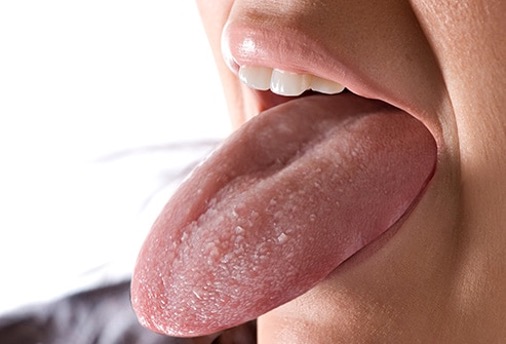There are 20 billion bacteria in your mouth that reproduce every five hours. If you go 24 hours without brushing, those 20 billion become 100 billion! Did you know that the majority of these bacteria reside on your tongue in the form of plaque?
In this column, we will discuss the tongue; that unique organ that plays a significant role in eating, tasting, swallowing, speaking and yes, harboring odors.
Have you ever noticed a white film on the top of your tongue? That film is a clear example of millions of bacteria. All of us have tongue bacteria and there are several kinds. Some of them are more harmful than others in certain situations, but most of them can result in poor oral hygiene. From bad breath to a more serious health problem, there are multiple reasons cleaning your tongue properly is important to good oral care.
The tongue is vital for chewing and swallowing food, as well as for speech. The four common tastes are sweet, sour, bitter and salty. The tongue has many nerves that help detect and transmit taste signals to the brain.
The tongue is made up of eight different muscle groups that interlock with each other creating a flexible band. The tongue muscles are the only muscles in the human body that work independently of any bones. Your tongue muscles never appear to get tired, as it assists in eating, talking and swallowing.
Did you know that the condition of your tongue also assists in diagnosing medical conditions? As a part of a normal screening dentists examine the general condition of your tongue. It tells the dentist much more than you think.
Our tongue is a flexible muscular organ. The tongue has many elevations, crevices and taste buds which help hide the bacteria. These elevations are homes for the bacteria. The surface of your tongue has bumps known as papillae within which bacteria may hide as well.
The back of your tongue has the highest concentration of microorganisms in your mouth. Therefore, keeping it clean is of vital importance. These bacteria can contribute to oral health conditions, such as bad breath, gum disease and tooth decay.
The easiest way to clean the tongue is to use a soft-bristled toothbrush, and more importantly a tongue scraper. The most common tongue scraper is soft, with flexible plastic that gently scrapes away the thin layer of debris and mucus-like coating from your tongue. The periodic scraping pulls the deeply embedded bacteria to the tongue’s surface.
Talk to your dentist about the best oral rinses for halitosis. Mouth rinses with a form of peroxide or other antibacterial properties tend to work best.
The tongue is a hotspot for bacteria and viruses and since it assists in the diagnosis of several oral health and medical diseases, closely examining your tongue is an important part of your dental check-up.
Removing bacteria helps to reduce the risk bad breath and also keeps the mouth smelling fresh. Bad breath is a very common problem and can affect people’s confidence and the way they interact with others. In the vast majority of cases, bad breath reflects problems in the mouth and it is advisable to see your dentist.
Prioritizing tongue cleansing as a part of a normal oral hygiene regimen will help to protect teeth and gums from disease and ensure that good oral health is enjoyed.
Your tongue is a valuable and necessary organ that is critical to your health and overall wellness. How you take care of your tongue determines the quality of your life socially and medically.
Remember this – “The tongue is a small organ yet what large damage it can cause.”
Dr. Kendal V. O. Major is Founder and CEO of Center for Specialized Dentistry which is a comprehensive family dental practice operating in Nassau and Freeport. He is the first Bahamian Specialist in gum diseases and dental implants since 1989. He also is a certified Fast braces provider. His practice is located at 89 Collins Avenue, Nassau at (242)325-5165 or [email protected]

Creamy white spots could be thrush, a fungal infection

Strawberry red tongue- possibly Kawasaki disease in children

“Smooth Tongue”- deficiencies in nutrients like iron, folic acid, B vitamins or some infections.

Macroglossia- Tongue too large for your mouth Associated with hypothyroidism, infection, or allergies





